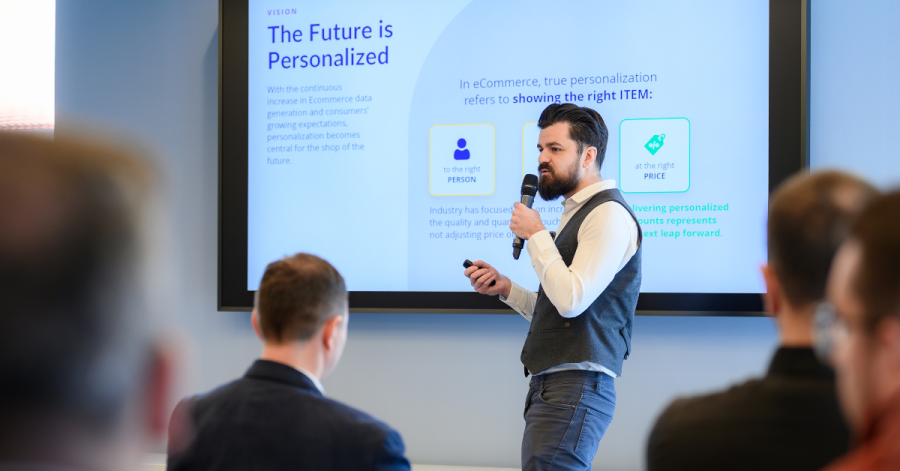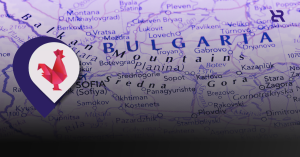For many Romanian scaleups, building a competitive product is only the first milestone. The greater challenge then lies in moving beyond the local market, where customer needs, competitive pressures, and growth models can be significantly different. Founders often find themselves overwhelmed deciding which markets to enter first, how to adapt their offer for scale, and how to get their leadership teams working during periods of fast growth.
The Cambridge business diagnostics workshops (Strategic Compass), part of EBRD’s Star Venture Programme, are tailored to address these challenges with intensive strategy sessions that offer founders a chance to step back from day-to-day operations and work through their growth priorities in a structured and guided way.
A Strategic Advisor’s Perspective
Nick Sullivan is a Strategic Advisor responsible for creating and delivering Strategic Compass sessions that have helped hundreds of potential startups across 26 countries in EBRD’s Star Venture Programme. The workshops are delivered under IfM Engage, one of the knowledge transfer vehicles of the world-class University of Cambridge.
During this time, Nick has refined this methodology through multiple cohorts worldwide.
How would you summarize the approach and targeted impact of the workshops?
We follow an agnostic structured process centered on the needs of each Star Venture company, a process that helps the company to self-diagnose and prioritize its challenges and opportunities for growth.
Companies that have completed the Strategic Compass workshops talk about the benefits of creating a structure, and being able to articulate clearly their thoughts for business success.
The impact is felt in two ways: first, the deliverable of each strategic session helps the company to immediately prioritize activities that can be made possible with the help of EBRD under Star Venture (i.e. accessing tailored business advice). Second, the company is armed and totally comfortable with a process (underpinned by world class research from Cambridge University) for future strategic planning.
You’ve refined this curriculum over multiple cohorts worldwide. What core gaps do you see in CEE scaleups that the Cambridge methodology is uniquely positioned to fill?
Typically scaleups in CEE are looking for rapid growth in new, larger markets. The methodology helps them to prioritise routes to new markets and addresses challenges such as adapting marketing messages and sales activities.
Which workshop tends to create the biggest “aha” moment for Romanian founders, and why?
Good question and hard to answer as each founder is different and each session tailored. I would say most “aha” moments come from either a clarification on which business opportunity is likely to give the highest ROI (session 3) and which actions are likely to give them Competitive Advantage (session 5).
Overall, it can be useful to have an independent facilitator to constructively challenge and ask difficult questions. After all, one would expect some challenging questions from Cambridge trained facilitators, and the more challenging the questions, the greater the likelihood of developing a robust and resilient business plan.
A Founder’s Perspective
Vlad Marincas, CEO and Co-Founder at Aqurate.ai, leads a company specializing in AI-based personalization, part of this year’s cohort of the EBRD Star Venture programme. Aqurate’s mission is to help eCommerce shops deliver a superior shopping experience and increase their revenues through AI-driven personalization.
Before joining the first workshop, what was the #1 strategic question your leadership team needed clarity on?
Before the workshop, we needed clarity on how to prioritize and evaluate new product development and business opportunities in a way that aligned with our resource constraints, internationalization strategy and market potential.
What were your expectations for these workshops and how did they fit into your growth plans?
We expected the workshops to give us a structured, objective framework for assessing new opportunities, not only from a technical or market-fit perspective, but also in terms of strategic alignment and feasibility. This fit directly into our growth plans by helping us make more data-informed decisions about where to invest our time and resources, while making sure that we “speak the same language” when it comes to the definitions of different factors.
What are your key takeaways after completing the workshops? What are the next steps and foreseen impact of the workshops on your growth?
Our key takeaways include a much clearer understanding of how to break down complex decisions into strategic components, and how to align cross-functional thinking. We have already started applying these frameworks to our pipeline of ideas, and we now have a common language and toolkit to evaluate them consistently. We expect this to lead to faster, more aligned decision-making and better resource allocation as we scale.
If you had to pitch these workshops to other startups, what would you say in one sentence?
If you’re a startup trying to grow smarter, not just faster, these workshops give you the clarity, tools, and frameworks to make strategic decisions in a data-driven way.
From Strategy to Impact
The lesson emerging from both sides of the table is that, without structure, growth can feel a lot like guesswork. For Romanian scaleups, speed should ideally be accompanied by the knowledge of picking the right battles and timing.
The Cambridge workshops brought to Romania by the EBRD can help achieve this, combining international insight with a grounded understanding of what it takes to scale from CEE. For alumni, part of the value lies in these initial insights, and part in the fact that they can return to these frameworks and reapply them as their companies evolve.
The EBRD Star Venture Programme is active in 26 of the Bank’s countries of operation, having helped over 550 early-stage companies. In Romania, the programme is funded by the TaiwanBusiness-EBRD Technical Cooperation Fund through the EBRD’s Small Business Impact Fund (Ireland, Italy, Japan, Korea, Luxembourg, Norway, Sweden, Switzerland, the United Kingdom, the United States of America and the TaiwanBusiness-EBRD Technical Cooperation Fund).







